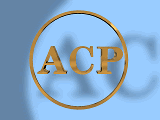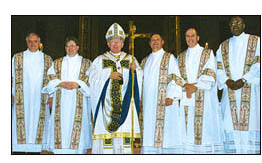American Catholic Press
16565 S. State Street, South Holland, Illinois 60473
|
||||||||||||||||||||
|
|
||||||||||||||||||||
|
||||||||||||||||||||
by Father James Monroe Barnett It has frequently been asserted that preaching was a function of the diaconate in the early Church.110An examination of the evidence, however, does not support this conclusion. Since the time of Irenaeus, as we have noted, the
Seven of Acts 6 were considered by some to have Canon 2 of the Council of Ancyra, c. 314 a.d. , has been interpreted to indicate that the deacon did preach at that time. The canon refers to lapsed deacons who had returned to the Church. It provides that they shall keep their office but specifies in this connection that they “shall abstain from making proclamations (kerussein).”112 Hefele here translates this term as “preach,” apparently on the assumption that deacons did preach, but adds in his commentary that other proclaiming functions of the deacon are also intended under the prohibition of this canon.113 The fact is that these other proclaiming functions are well authenticated, preaching is not. Bingham argues convincingly that “preaching” here is not correct but, rather, the term is to be understood to refer to the deacon as “the sacred crier of the congregation,” citing others maintaining this view. Henry Percival in his commentary on the canon supports Bingham and sees this as a reference to the reading of the Gospel and the numerous proclamations of the deacons at the Eucharist.114
Echlin rightly sees, as we have noted previously, that the bishops and deacons took over the function of the prophets and teachers. However, he argues that deacons as well as bishops assumed the functions of both the prophets and teachers, and therefore of preaching:
Other evidence from the period indicates that the bishop was the one who assumed the function of presiding at the eucharistic assembly and preaching from the prophets, and the deacons assumed other functions in the leadership and ministry of the local Church. Brockman interprets the Didaché to mean that the deacon’s ministry of the word at this time was of a catechetical nature.118 In light of the evidence, it is more logical to interpret this passage to mean simply that the leadership of the Church was transferred in this period from the prophets and teachers to the bishops and deacons, the bishops assuming some of the functions and the deacons others. Evidence from other sources clearly makes preaching along with presiding at the Eucharist a function of the bishop, not the deacon. The letter of Ignatius of Antioch To the Philadelphians is also seen by Echlin to contain evidence that deacons preached at this early date. He translates the pertinent passage, “Philo, the deacon from Cilicia who has been so well spoken of, is at present giving me his help in preaching God’s word.” However, Gerald Walsh in The Fathers of the Church translates the phrase in question, who is now ministering to me in the word of God,” and the translator of this letter in the Ante-Nicene Fathers renders it “who still ministers to me in the word of God.” Richardson translates the phrase “he is helping me in God’s cause.119 Again, the weight of evidence clearly favors an understanding other than preaching. In the fifth century there is one clear reference to a deacon preaching. The historian Philostorgius reports, c. 430, that Aetius, a deacon of Antioch, was allowed to preach publicly in the church by his bishop, the Arian Leontius. Echlin cites this as evidence not only that the deacons “still preached” but also that the deacon Aetius “contributed to the demise of diaconal preaching” by preaching Arianism.120 But it is more probable that preaching by deacons is not to be found later because it was never a function of the order itself. The great classic writer of the Syrian Church, Ephraem Syrus, d. 373, who remained a deacon throughout his life, is described by Altaner as “a brilliant exegete, controversialist, preacher, and poet.” His reputation as a preacher, however, may well be due to the excellence of his written compositions, which Jerome records were read in many churches immediately after the Scriptures, presumably as the sermon at the Eucharist.121 The reading of such homilies by deacons is in accord with the legislation of the Second Council of Vaison (529). Canon 2 provides, “Not only in the cities, but also in all rural churches the priests may preach. If the priest is hindered through sickness, a deacon should read a homily by a Father of the Church.122 The clear implication here is that deacons did not preach. However, even were it true that Ephraem preached, he apparently did so more due to his special charisma than to his office as a deacon. In writing of the diaconate in the medieval Church, Brockman says that it is clear that deacons were “ordained to the ministry of the word” and that this ministry remains a major diaconal function in both the East and the West. However, he sees it in a missionary context, envisioning the deacon in his ancient role as a kind of messenger of the bishop who sought out “those in need, prospective converts, and the poor” and brought word back to the bishop.123 He does not mention liturgical preaching. The assertion that deacons preached as a matter of their office in the early Church is clearly contrary to the evidence. The function belonged normally to the president of the eucharistic assembly; and except when deacons functioned in that capacity as an extraordinary act, there is very little, if any, reason to believe that they preached before the Church. It is probable that preaching came to be thought of as a diaconal function in the Medieval period, when the diaconate had become largely an interim or transitional office on one’s journey to the priesthood.124
References: Barnett, James Monroe, The Diaconate: A Full and Equal Order: A Comprehensive and Critical Study of the Origin, Development, and Decline of the Diaconate in the Context of the Church's Total Ministry. Trinity Press International, 1983. pp.80-83. 110. Echlin, The Deacon in the Church Past and Future, 17, 21, 76. Cf. Schamoni, Married Men as Ordained Deacons, 15, and Holmes, Future Shape, 25. Bingham, The Antiquities of the Christian Church, 2.20.11, 1:260 – 61, says that deacons preached but only with the license of the bishop. 111. Brockman, Ordained to Service, 8. 112. The Council of Ancyra, in The Seven Ecumenical
Councils, ed. Percival, in Nicene and 113. Hefele, History of the Councils, 1:202-3. 114. Bingham, The Antiquities of the Christian Church, 2.20.10, 1:260. See Percival’s commentary on Canon 2, in The Council of Ancyra, in Nicene and Post-Nicene Fathers, 2d ser., 14:64. 115. Echlin, The Deacon in the Church Past and Future, 16. 116. The Didache or Teaching of the Twelve Apostles 15.1, 2, trans. Francis X. Glimm, in The Apostolic Fathers, vol. 1 of The Fathers of the Church, trans. Glimm et al., 183. 117. Echlin, The Deacon in the Church Past and Future, 17. 118. Fuller, “Early Catholicism”; Brockman, Ordained to Service, 21. 119. Echlin, The Deacon in the Church in Past and Future, 21 (the citation is To the Philadelphians 11), Ignatius, To the Philadelphians 11, an �The Letters of St Ignatius of Antioch,� trans Gerald G. Walsh, in The Apostolic Fathers, vol.1 of The Fathers of the Church, trans.Glimm et al., 117; Ignatius, To the Philadelphians 11, in Ante-Nicene Fathers, 1:85, and in Early Christian Fathers, ed. Richardson, 111. 120. Philostorgius, Ecclesiastical History 3.17, in Patrologiae
Cursus Completus Omnium SS. 121. Altaner, Patrology, 401; Jerome, De Scriptor. Eccles. 115, in Bingham, The Antiquities of the Christian Church 1:262n. The Greek text, in which Photius says that Ephraem composed several excellent sermons that were translated into other languages after his death, is also given in Bingham, The Antiquities of the Christian Church 1:262n. 122. Hefele, History of the Councils, 4:170. Italics added. 123. Brockman, Ordained to Service, 28.
|
||||||||||||||||||||

 been
deacons, although modern scholarship has come down overwhelmingly
on the side of John Chrysostom and other early writers who said the
Seven were not deacons. Stephen and Philip, the only two of the Seven
mentioned later in the New Testament, have been thought of as evangelists,
Philip being so described in Acts 21:8. Although Brockman argues
that the thing Stephen and Philip are doing in Acts “represents
an essentially catechetical instruction” and that they are
simply doing what any committed Christian
would,
been
deacons, although modern scholarship has come down overwhelmingly
on the side of John Chrysostom and other early writers who said the
Seven were not deacons. Stephen and Philip, the only two of the Seven
mentioned later in the New Testament, have been thought of as evangelists,
Philip being so described in Acts 21:8. Although Brockman argues
that the thing Stephen and Philip are doing in Acts “represents
an essentially catechetical instruction” and that they are
simply doing what any committed Christian
would,